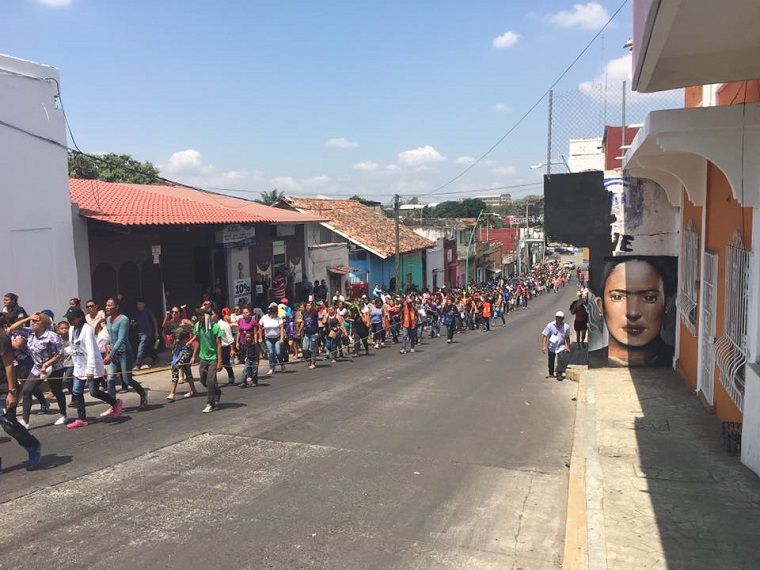
We can't let Trump use this humanitarian call to further militarize our border communities.
By now, you’ve probably heard about President Trump’s response to the caravan of migrants traveling across Mexico to highlight humanitarian issues in Central America—and the rights of individuals to seek international protection.
In his tweets, Trump sought to dehumanize these men, women, and children, many of whom were escaping violence and seeking asylum and humanitarian assistance.
When I saw the coverage of the caravan, I saw courage, solidarity, and desperate hope. I saw strength and protection in people banding together. I saw Mexican churches and communities offering compassion, hospitality, and support to people who were likely making the most difficult journey of their lives.
I’ve seen firsthand some of the conditions that have forced people to flee. Last year, Hondurans took to the street in massive protests after President Juan Orlando Hernandez won re-election, despite massive fraud and international condemnation. Honduran police and military cracked down on protesters with terrifying violence, killing at least 30 and injuring hundreds more.
While I visited Honduras in January, I met the family members of protesters who were shot dead by military police and other victims of the government’s gross violations of human rights. I saw the heavy militarization of the country, with police and soldiers posted at every other intersection, and I saw how quickly and forcefully they worked to thwart any sign of protest, converging on protesters with their faces covered and guns drawn.
Hondurans also experience some of the highest levels of generalized violence in the world as well deep inequality and poverty. U.S. foreign policy—including providing millions of dollars in weapons and military training to the Hernandez regime—has also helped fuel instability in Honduras. This is why several hundred Hondurans joined the caravan of migrants organized by Pueblo sin Fronteras this year.
But President Trump portrays this same caravan of people in need as a threat, tweeting messages that play to xenophobic fears. Perhaps more dangerously, Trump is using the caravan as an opportunity to advance his agenda to further militarize our southern border.
For decades, anti-immigrant policies have systematically militarized our southern border communities—criminalizing millions of immigrants and creating dangerous and repressive conditions from California to Texas. Border communities are terrorized by Border Patrol Agents—who operate with impunity—and subjected to walls and surveillance that cut through towns and protected lands.
Trump wants to escalate these assaults on our border communities. For example, he has tweeted that he wants to:
- Deploy thousands of National Guard troops to the U.S.-Mexico border.
- Eliminate protections for unaccompanied children from Central America and other countries making it easier to deport children back to the dangerous conditions that caused them to flee.
- Detain asylum seekers and others indefinitely in dangerous, sometimes deadly conditions in mostly for-profit detention centers across the country.
Although Trump claimed that Mexico has done nothing to stop people from entering through its southern border, Mexico has actually deported huge numbers of Central Americans every year since 2014. That year, the United States began funding Mexico’s Southern Border Initiative and putting heavy pressure on its government to ramp up arrests and deportations, especially of children.
And while Mexico’s asylum laws are arguably stronger than those of the United States, its asylum system is woefully underfunded and overburdened. Mexico received 14,496 asylum applications in 2017—more than four times the number from just two years earlier.
Still, authorities in Mexico have offered many caravan participants humanitarian visas or short-term permission to remain in the country, allowing them to decide whether to stay in Mexico, or continue on and apply for asylum in the United States.
Caravan participants who want to seek asylum in the U.S. made the last leg of the journey together from Mexico City to the border near San Diego, arriving over the last few days. When they turn themselves in at our border—as hundreds plan to do—our government should respect the rights they’re granted under international and U.S. law and allow them to apply for asylum here.
If caravan participants are turned away at the border—or denied a fair hearing and returned to dangerous conditions—we will have failed not only international law but a grave moral test. When we had the opportunity to protect the persecuted, we chose to drive them away with our military.
Instead of talking about troops and further criminalizing immigrants, we could follow the example of churches and communities along migrant routes and open our doors and hearts to those who seek protection and a better life. We can use the strength and courage the caravan inspires and send some of that along to our elected officials, asking them to stand up to hateful, fearful responses and demonstrate compassion and humanity instead.
Take action today: Tell Congress to stop the further militarization of our southern border.